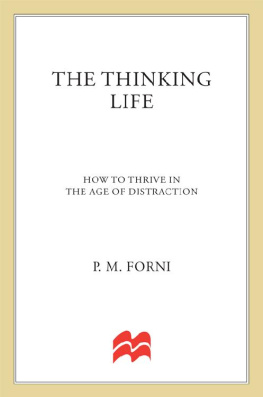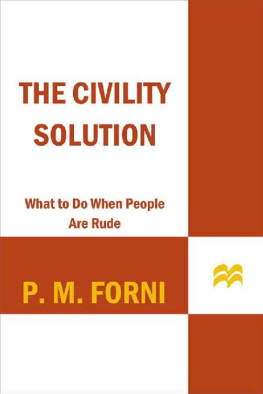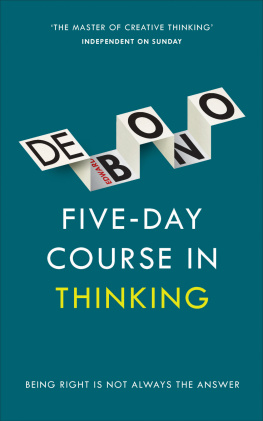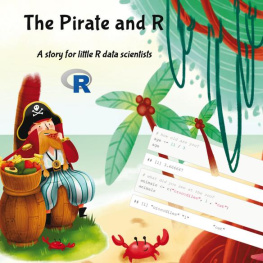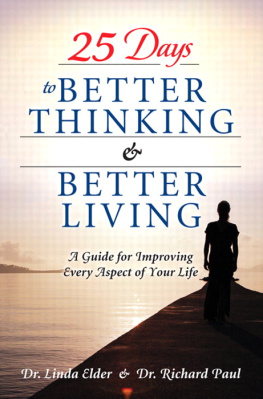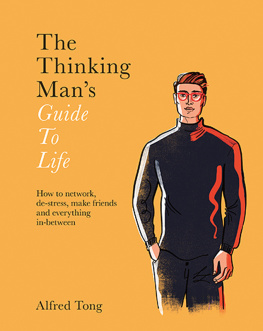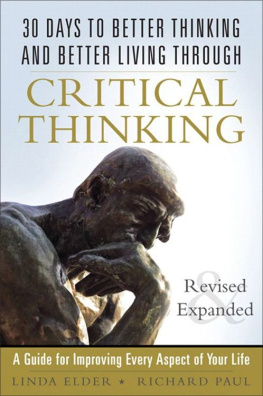P. M. Forni - The Thinking Life
Here you can read online P. M. Forni - The Thinking Life full text of the book (entire story) in english for free. Download pdf and epub, get meaning, cover and reviews about this ebook. year: 2011, publisher: St. Martins Publishing Group, genre: Religion. Description of the work, (preface) as well as reviews are available. Best literature library LitArk.com created for fans of good reading and offers a wide selection of genres:
Romance novel
Science fiction
Adventure
Detective
Science
History
Home and family
Prose
Art
Politics
Computer
Non-fiction
Religion
Business
Children
Humor
Choose a favorite category and find really read worthwhile books. Enjoy immersion in the world of imagination, feel the emotions of the characters or learn something new for yourself, make an fascinating discovery.
The Thinking Life: summary, description and annotation
We offer to read an annotation, description, summary or preface (depends on what the author of the book "The Thinking Life" wrote himself). If you haven't found the necessary information about the book — write in the comments, we will try to find it.
The Thinking Life — read online for free the complete book (whole text) full work
Below is the text of the book, divided by pages. System saving the place of the last page read, allows you to conveniently read the book "The Thinking Life" online for free, without having to search again every time where you left off. Put a bookmark, and you can go to the page where you finished reading at any time.
Font size:
Interval:
Bookmark:

For Virginia, always
A Note of Thanks
To Christie Toribara and her family, Crystal Guenguerich, Claire Davis, Beth Holloway, William Leeb, Lucia Bosi, Dr. Stephen Reich, Lisa DiMona, Michael Flamini, Vicki Lame, Tobias Steed, Chris Aldrich, Tania Zampini, and Virginia Forni.
Thanks also to One , the magazine of the Carey Business School at Johns Hopkins University: A small fragment of this book appeared in its Spring/Summer 2010 issue.
P.M.F.
Towson, Maryland, April 2011
Contents
INTRODUCTION
CONCLUSION
OURS IS AN AGE OF DISTRACTION. THE BACKGROUND OF OUR LIVES IS THE WHITE NOISE OF INCONSEQUENTIAL TELEVISION PROGRAMS, POMPOUS PUNDITS, SHRILL TALKBACK CALLERS, TEN-SECOND NEWS GRABS, AND THE CULT OF CELEBRITY. IN THIS ENVIRONMENT, THE NEED FOR CONTEMPLATION AND SOME INTROSPECTION BECOMES COMPELLING; A TIME TO STOP AND THINK; TO MAKE OUR WAY, GUIDED BY A MORAL COMPASS, A BEARING THAT DIVINES OUR BEST INSTINCTS.
Paul Keating
THERES SOMETHING TO BE SAID
FOR SITTING STILL AND LETTING THINGS COME CLEAR,
THE WAY MORNING FOG BURNS OFF THE LAKE.
George Witte
Preface
When the idea of writing a book that would rediscover the merits of the thinking life was still coalescing in my mind, one day I jotted down a couple of paragraphs with what, in essence, was the rationale behind the project. Quite uncharacteristically, those paragraphs were in the form of a report by a visitor to Earth from another galaxy. Having put them aside while I considered other projects, I had half forgotten them when I found them in a binders pocket.
As the first week of my mission on Earth comes to a close, I must report a puzzling find. You remember that in a previous message I described the ability that all humans have to silently converse within their own selves. This internal conversation, which they call thinking, allows them to take stock of the world around them and to plan their most suitable ways of dealing with it. If there is something that I could determine for sure about life on Earth, it is that happiness is the most coveted good, and that it is a by-product of the good life. You will then fully understand the importance of thinking when I tell you that it is virtually impossible to build a good life without the foundation of good thinking. What has been puzzling me is the cavalier way in which humans use such a core faculty. Any intergalactic visitor would be as struck as I am by their overindulging in thought-avoidance. The amount of their time spent in serious thinking does not even get close to that spent in mindless entertainment and the exchange of unnecessary information. From lack of thoughtful awareness of any situation in which they find themselves to the failure to prepare for adversity, inadequate thinking is without a doubt the number one cause of their grief and sorrow.
Even to a novice student of the human experience it becomes immediately apparent that good thinking is the necessary prelude to making good decisions. Training their children in it has to be a primary concern for human parents, you would think. Well, it is not. Does such training occupy a prominent position in the schools curricula? It does not. And so good thinking fails to become second nature. On account of lack of thinking humans keep arriving unprepared to the crossroads of their lives where they must make decisions upon which the quality of their remaining time on Earth depends. In sum: A distinctive human character is the inclination to relentlessly pursue the trivial. That makes them waste an enormous amount of time and energy that would be better spent on matters of consequence. It is heartbreaking indeed to witness their unwitting sabotage of their own livesbecause this is what their avoidance of serious thinking amounts to. I wonder what it is going to take for them to realize how crucial this issue is and to start a serious effort to reform their ways.
Respectfully submitted.
Now, I am not one who believes that when nobody is looking, extraterrestrial spaceships make scheduled stops in Paramus, New Jersey. In fact, Im not even a science fiction fan. However, I know that a familiar landscape often escapes attention. It is the eyes of the stranger that see what remains unnoticeable under the varnish of the ordinary. In this case, the stranger was the extragalactic visitor who is struck by the fact that humans dont seem to realize they are not thinking nearly as much as they should. My challenge with this book is to make a few suggestions about changing that situation. I want to get as many people as possible to get serious about serious thinking.
In this age that has made distraction a way of life, the essence of my message could not be simpler: Think if you wish to thrive. In conveying it, I have enlisted some of the most influential thinkers from antiquity, such as Aristotle, Epictetus, Plato, and Marcus Aurelius. Being the product of an education that placed emphasis on the classics, I am at ease in their presence and enjoy pointing out all that in their thinking is relevant to our lives today. The essential features of human life have not changed in the last twenty-five hundred years, and the eloquent wisdom Athens and Rome have bequeathed us is still eminently applicable. Why reinvent the wheel when somebody is handing you a well-crafted and perfectly functioning one? This book will acquaintor reacquaintyou with the basic and the best in thinking habits and thinking skills. Ultimately, the good life is the thinking life. If you want to reach its sunny shores, youd better rediscover the causeways of thinking. It is by choosing to think that you are going to take the first necessary step toward lifes elusive grand prizetrue happiness. My joba very gratifying oneis making it easier for you to take that step.
Introduction
Thinking Seriously About Serious Thinking
BY THE BEGINNING OF 2009, THE AVERAGE AMERICAN CELL PHONE USER WAS SENDING OR RECEIVING NEARLY 400 TEXTS A MONTH, MORE THAN A FOURFOLD INCREASE FROM 2006. THE AVERAGE AMERICAN TEEN WAS SENDING OR RECEIVING A MIND-BOGGLING 2,272 TEXTS A MONTH. WORLDWIDE, WELL OVER TWO TRILLION TEXT MESSAGES ZIP BETWEEN MOBILE PHONES EVERY YEAR, FAR OUTSTRIPPING THE NUMBER OF VOICE CALLS. ITS OFTEN ASSUMED THAT THE TIME WE DEVOTE TO THE NET COMES OUT OF THE TIME WE WOULD OTHERWISE SPEND WATCHING TV. BUT STATISTICS SUGGEST OTHERWISE. MOST STUDIES OF MEDIA ACTIVITY INDICATE THAT AS NET USE HAS GONE UP, TELEVISION VIEWING HAS EITHER HELD STEADY OR INCREASED.
Nicholas Carr
ARENT A SOCIETYS COMPETITIVENESS AND ITS PROSPECTS FOR A BETTER FUTURE ROOTED IN MORE THAN SHEER TECHNOLOGY? ISNT HOW WELL WE USE THE DEVICES AS CRUCIAL AS HOW FAST THEY ARE? WILL PURSUING MORE AND MORE DIGITAL CONNECTEDNESS MAKE US SMARTER AND MORE CREATIVE? WILL IT HELP US UNDERSTAND ONE ANOTHER BETTER? WHEN WERE ALL HYPERCONNECTED, WILL OUR FAMILIES AND COMMUNITIES BE STRONGER? WILL WE BUILD BETTER ORGANIZATIONS AND LEAD MORE PROSPEROUS LIVES? MOST IMPORTANT, CAN WE ACCOMPLISH ANY OF THESE LOFTY GOALS IF WE CONTINUE DEVOTING ALL OUR ENERGY TO ELIMINATING THE VERY THING WE NEED MOST TO ACHIEVE THEM IN THE FIRST PLACESOME SPACE BETWEEN TASKS, RESPITES, STOPPING PLACES FOR THE MIND?
William Powers
A CRISIS OF CONCENTRATION
In late July 2008, as the race for the White House was fast approaching its homestretch, an utterly exhausted candidate Obama flew to Europe on a multi-nation journey meant to invigorate his credibility as a statesman. As he met with Tory leader David Cameron in London, an ABC News live boom microphone picked up the private and informal conversation, which then became available to a world that was only too happy to eavesdrop. In it, Mr. Cameron expressed concern about his American visitors punishing work regimen. After mentioning an upcoming short August break, Mr. Obama shifted focus from lack of downtime to lack of thinking time:
Next pageFont size:
Interval:
Bookmark:
Similar books «The Thinking Life»
Look at similar books to The Thinking Life. We have selected literature similar in name and meaning in the hope of providing readers with more options to find new, interesting, not yet read works.
Discussion, reviews of the book The Thinking Life and just readers' own opinions. Leave your comments, write what you think about the work, its meaning or the main characters. Specify what exactly you liked and what you didn't like, and why you think so.

